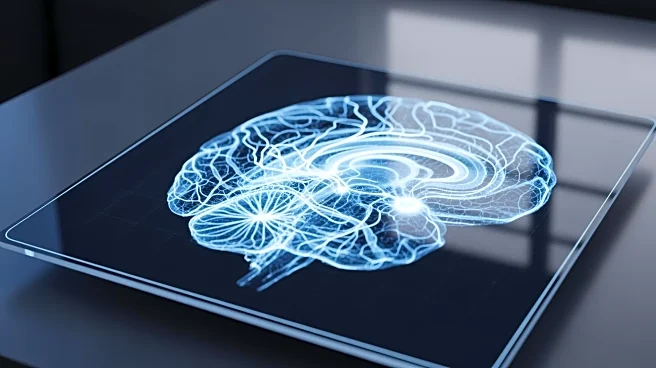What's Happening?
Recent discussions among neurologists have highlighted the role of brain scans in assessing cognitive health, particularly in women who are at a higher risk of developing dementia compared to men. Brain scans, including CT and MRI, provide detailed images
of the brain's structure and are used to diagnose neurological issues. However, experts caution against routine brain scans without medical consultation due to potential stress and unnecessary procedures. Dr. Lauren Koffman, a neurologist, emphasizes that brain scans should be part of a comprehensive assessment when symptoms suggest neurological problems. Dr. Jessica Caldwell from the Cleveland Clinic advises individuals concerned about cognitive health to consult their doctors for appropriate testing, which may include brain imaging if necessary.
Why It's Important?
The significance of brain scans lies in their ability to detect structural changes in the brain that may indicate neurodegenerative diseases like Alzheimer's. Early detection through imaging can lead to timely interventions and better management of cognitive decline. However, the cost and potential anxiety associated with unnecessary scans highlight the need for careful consideration and professional guidance. This discussion underscores the importance of personalized medical advice in cognitive health management, particularly for those at higher risk of dementia. It also reflects broader concerns about healthcare accessibility and the need for informed decision-making in preventative health strategies.
What's Next?
Individuals concerned about their cognitive health are encouraged to seek medical advice to determine the necessity of brain scans. Neurologists may recommend scans based on symptoms and risk factors, ensuring that imaging is part of a targeted approach to diagnosis and treatment. As awareness of cognitive health grows, healthcare providers may focus on educating patients about the benefits and limitations of brain scans, promoting informed choices. The conversation around brain scans may also influence insurance policies and healthcare practices, potentially leading to more accessible and affordable diagnostic options.
Beyond the Headlines
The discussion on brain scans touches on ethical considerations regarding patient autonomy and the potential for over-medicalization. It raises questions about the balance between preventative care and the risk of unnecessary interventions. Additionally, the focus on women's higher risk of dementia highlights gender disparities in healthcare and the need for tailored approaches to cognitive health. As research continues to evolve, the role of brain scans in early detection and personalized medicine may expand, offering new insights into neurodegenerative diseases and their management.















